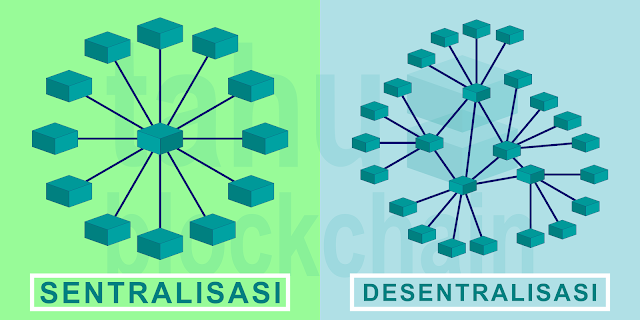Decentralization
Decentralization is an activity that is carried out by giving strength to one another to a point where the power that is accumulated at one point can be used for the benefit of the overall power provider and is not influenced by a part, be it the government or other parties, for example, such as installing wifi at home so the payment process is carried out jointly by the family so that the wifi can be used by all families and more of the payment is used for unexpected costs such as damage to the wifi network, the money collected is used for repairs. So to use this free wifi there are no restrictions from certain parties limiting the use of the wifi.
Centralization
Centralization is a process where all activities that occur using a centralized system must follow a special rule that has been set by the legal entity and we must not interfere with this unless the controlling holder does it, for example, like we install wifi in our homes we collect money together but we are prohibited from using wifi at certain hours by our father because he is the controller in the house.
The difference between decentralization and centralization is that if we do decentralization in activities that use a decentralized system, we are free to do anything without any restrictions from one party because with the decentralized system we are given the freedom to do anything that can make ourselves profitable. Meanwhile, centralization means that everything we do has been controlled by one control holder, even though we invest in the system, we are not free to do anything because there is a control holder who controls everything.
Advantages of decentralization
- Fraud prevention
- Protection
- Faster transaction time
- Increased financial efficiency
- An effective store of value
Disadvantages of decentralization
- Crime
- Volatility
- Storage issue
- At your own risk
- Must be careful in making decisions
Centralized Advantages
- All activities are organized
- If you make a mistake you can take it back
- the benefits obtained are in accordance with the central rules
- Can report whatever happened to the central party
- The central party bears all the risks that occur
Centralization disadvantages
- Not free
- Must follow the rules
- Everything that is needed by the central party must be fulfilled
- Can't break the rules
- Whatever is decided by the central party must be accepted
For the trading business it is better to use decentralization because we are free to invest in what we want to choose and do not have anything to do with other people if we make our own mistakes then we are on our own if we are successful then we are successful ourselves.
Blockchain is decentralized because blockchain is free and open to people who want to do validators and transaction nodes.**
Conclusion
of the two systems so I conclude that the two systems are needed depending on the needs of the system users, if you want to follow a rule that is controlled by 1 center then you have to choose centralization and if you want to be free in doing free validators there are no restrictions then you have to choose decentralization
